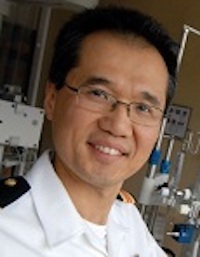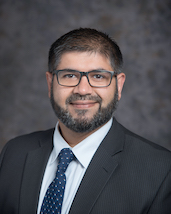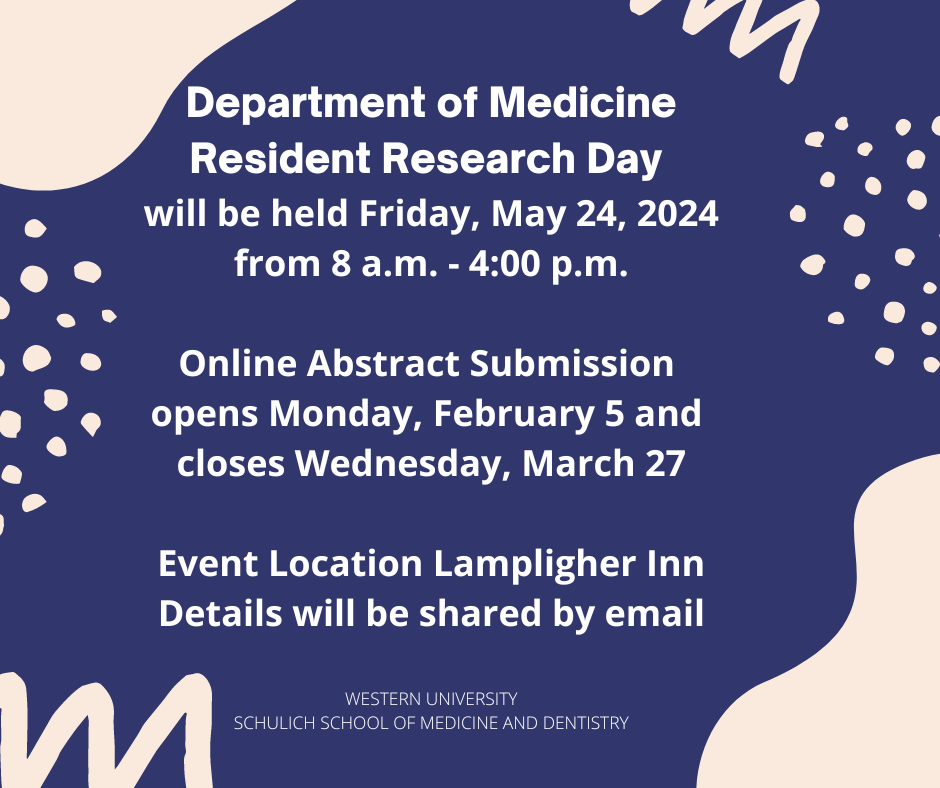A B C D E F G H I J K L M N O P Q R S T U V W X Y Z |
| Critical Care Medicine |
 RAYMOND KAO, MD, FRCPC, Professor RAYMOND KAO, MD, FRCPC, Professor I was appointed to the Faulty in September 2003 as Assistant Professor in the Department of Medicine. In addition to regular commitment to teaching at the undergraduate (medical students) and graduate (residents and fellows) teaching level, I have established a clinical training program for the Canadian Armed Forces’ military physician assistants (PA) to do their clinical phase training at The University of Western Ontario starting in 2004. At the present time the trainees do their rotations in Trauma, Internal Medicine, General Surgery, Orthopedics, Sports Medicine, Urology and Psychiatry. Effective academic year 2007-2008 two new rotations, ENT and Anesthesia, were added to the clinical phase. Now in its fifteenth year at Western University, it has been well received not only by the trainees, the military hierarchy but also by the faculty. The PA clinical training at London enhanced the students’ knowledge and experience in caring of the wounded and the sick in the war zone such as Afghanistan, Iraq and other peacekeeping missions around the world. This program also helped the hospitals affiliated with the Western University to be involved with a new pilot program established by the Ontario Ministry of Health to establish PA in the various hospitals in Ontario. My research activities consisted of both animal and clinical studies with collaboration in both areas. The animal studies of particular importance related to erythropoietin (rHuEPO) and C-Peptide therapy in septic and hemorrhagic shock. As principal investigator for the initial established rHuEPO in septic mice resulted in an abstract oral presentation in the 9th World Congress of Intensive and Critical Care Medicine followed by its publication in Critical Care journal. The positive results from the septic mice model have prompted new clinical research of the effect of rHuEPO in septic patients in the ICU and this project is in progress. In my lab I have further developed a rHuEPO on hemorrhagic shock rat model in which became an award winning abstract oral presentation at the European Society of Intensive Care Medicine in Berlin. At the present time we are also looking at the effect of C-Peptide in a hemorrhagic shock and resuscitation rat model. I am also involved in large data analysis for the intensive care unit. I published a 24-hour mortality prediction model using logistic regression analysis on 8822 patient observations. At the present our group is performing an external validation of the proposed model using the Critical Care Information System (CCIS) dataset across all Level III ICUs in Ontario. Keywords: Hemodynamics Hemorrhagic shock Microcirculation Resuscitation Sepsis Tissue oxygenation Ventilated trauma patients |
| Cardiology |
 HABIB KHAN, MD, MBBS, PhD, Assistant Professor HABIB KHAN, MD, MBBS, PhD, Assistant ProfessorDr. Habib Khan is an Assistant Professor in the Division of Cardiology, Department of Medicine, Schulich School of Medicine and Dentistry, University of Western Ontario. He is a member of the Arrhythmia Service at the London Health Sciences Centre in London, Ontario. He received his medical degree at the University of Peshawar, Pakistan and completed his postgraduate internal medicine in Ireland obtaining MRCP Ireland. He pursued training in Cardiology and Internal medicine in Nottingham and obtained MRCP UK. He subspecialized in adult cardiac electrophysiology with a 2-year fellowship in Nottingham and a further 2-year fellowship here in the London Heart program of University Hospital. In addition to the clinical training, he spent three years in clinical research at the Brompton and Harefield Hospital and Imperial College London and was awarded Ph.D. in 2020. Dr. Khan’s research interests include the evaluation of atrial function using multimodality imaging in patients with atrial fibrillation and the association of autonomic dysfunction in cardiac arrhythmias. His other research interests include the effects of His Bundle pacing and left bundle branch area pacing on the left ventricle in patients with heart failure or risk of heart failure. Dr. Khan is an active supporter of research and collaborates well with others in the division of cardiology and other medical specialties. He has publications in peer-reviewed journals and is keen to continue his path in research with an emphasis on advanced cardiac pacing, and autonomic dysfunction. He is the lead of the Inherited Arrhythmia / Cardiac Conditions service and takes part in extensive research collaboration with the Hearts in Rhythm Organization (HIRO) network across Canada. Over his career, he has published over 100 abstracts and manuscripts; and presented at international conferences, including ESC, AHA, BCS, HRS, and CHRS. He is also a reviewer in established journals such as JACC, Heart Rhythm, PACE, Cardiac Electrophysiology, JAMC and was Junior Editor for EHJ Case Reports. He is engaged in co-supervising PhD student, mentoring medical students through work-study experience and SRTP programs alongside cardiology and EP fellows. Keywords: Arrhythmia Atrial fibrillation Atrial strain imaging Cardiac resynchronisation therapy (CRT) His bundle pacing (HBP) Left bundle branch area pacing (LBBAP) |
| Gastroenterology |
 QASIM KHAN, MD, FRCPC, Assistant Professor QASIM KHAN, MD, FRCPC, Assistant ProfessorDr. Khan is an Assistant Professor in the Department of Medicine, Division of Gastroenterology, with cross-appointment in the Department of Epidemiology and Biostatistics. Additionally, he is a Faculty Scholar in the Institute for Clinical and Evaluative Sciences (ICES) at Western University. He completed his medical training with distinction at the King Edward Medical University in Lahore, Pakistan. He subsequently pursued post-graduate medical training in the United States where he completed his Internal Medicine residency and Gastroenterology fellowship at the University of Chicago followed by advanced fellowship training in Transplant Hepatology at the Mayo Clinic in Rochester, MN. He later pursued an Executive Master's in Epidemiology from Columbia University. As a clinician-researcher, Dr. Khan’s areas of research interest include: (1) Evaluation and optimization of nutritional and cardiometabolic status in the pre- peri- and post-liver transplantation periods, focusing on trends and prevention of post-transplant weight gain, diabetes mellitus, metabolic syndrome and allograft steatosis; (2) Diagnosis, risk stratification, prognostication and management of steatotic liver disease (including MASLD, MetALD and ALD); as well as (3) Portal Hypertension. He is a steering member of the Vanguard Committee of the International Liver Transplantation Society (ILTS), and an active member and oft speaker for the Canadian Association for the Study of the Liver (CASL), and American Association for the Study of the Liver (AASLD). |
| Gastroenterology |
 REENA KHANNA, MD, MSc, FRCPC, Professor REENA KHANNA, MD, MSc, FRCPC, ProfessorDr. Reena Khanna is a Professor of Medicine at the University of Western Ontario, and a Clinician Researcher in the Program for Experimental Medicine. She completed her MD and Internal Medicine residency at the University of Western Ontario, Gastroenterology fellowship at McMaster University. Dr. Khanna completed an advanced fellowship in inflammatory bowel disease (IBD) at the Cleveland Clinic, followed by a research fellowship in international IBD clinical trials at the University of Western Ontario. She completed an MSc in clinical epidemiology at McMaster University. Her clinical and research interests are clinical trial design, new therapeutics, outcome measures. She has designed, conducted and published several studies, including the first cluster study in IBD. Dr. Khanna holds international grants and most recently was awarded the Crohn’s Colitis Canada’s rising star award for her research contributions. Keywords: Inflammatory bowel diseases Outcome measurements Randomized controlled trials Therapeutics Validation |
| Clinical Pharmacology |
 RICHARD KIM, MD, FRCP(C), FACP, FCAHS RICHARD KIM, MD, FRCP(C), FACP, FCAHSWolfe Medical Research Chair in Pharmacogenomics Professor of Medicine, Physiology & Pharmacology, and Oncology Chair, Division of Clinical Pharmacology & Toxicology Dr. Kim received his medical degree from University of Saskatchewan, Canada in 1987. After completing an internship and residency training at Royal University hospital in Saskatoon Canada in 1991, he went on to carry out postdoctoral fellowship training in Clinical Pharmacology at Vanderbilt University. In 1994, upon completion of his fellowship training, he remained at Vanderbilt Clinical Pharmacology and rose through the ranks to full Professor by 2004. July 2006, he and his group moved from Vanderbilt University to the Department of Medicine at the University of Western Ontario, to lead a program of Translational and Personalized Medicine research. He is currently Professor and Chair of the Division of Clinical Pharmacology, Associate Chair for Research in the Department of Medicine at the University of Western Ontario in London, Canada. He is a Scientist at the Lawson Health Research Institute. His research interest is that of understanding the molecular basis of interindividual differences in drug disposition and the application of such finding to the emerging field of Personalized Medicine. Dr. Kim is known for his pioneering work on the role of drug transporters as determinants of variable drug response and toxicity. His seminal 1998 publication in the Journal of Clinical Investigation that outlined a key role of the efflux drug transporter P-glycoprotein in limiting the CNS entry of HIV protease inhibitors provided a mechanistic basis for why HIV may be able to survive in organs such as the brain, and thereby viewed as “sanctuary” sites for viral replication. This publication has been cited over 1,000 times. In addition, Dr. Kim’s group was the first to identify and functionally characterize genetic variation in a transporter now referred to as OATP1B1 (gene name SLCO1B1) in 2001. He showed the importance of SNPs in this transporter to the clearance of statin class of lipid lowering drugs. A commonly occurring functional single nucleotide polymorphism (SNP) first identified by Dr. Kim’s group in this transporter has now been shown in a large clinical trial (SEARCH Group. New Engl. J. Med, Aug 2008) as the most predictive genetic marker for statin-induced myopathy. This has a major clinical implication since nearly 3 million Canadians are on statin therapy. Dr. Kim has also been at the forefront of fundamental research on regulation of drug metabolizing enzymes. His group was the first link a critical role of a liver-enriched nuclear receptor called HNF4alpha to the CYP3A4-mediated (an enzyme responsible for the metabolism of nearly 50% of all the drugs in clinical use) inductive process (Nature Medicine 2003). His publications have been cited over 21,000 times at a rate of at least 1000 citations/year with an average citations of 104/publication, with an h-index of 76. He is an internationally recognized leader in the field of pharmacogenomics, both in the identification of clinically relevant genetic variations, but also in the application of such finding to the delivery of Personalized Medicine to our patients. His group was the first in Canada to start a personalized warfarin clinic at the University Hospital, at the London Health Sciences Centre in 2008. He is now moving forward with a comprehensive Personalized Medicine Program focused on individualization of drug therapy for cancer, vascular diseases, diabetes, children, and the elderly. Dr. Kim received the Leon-Goldberg Young Investigator Award from the American Society for Clinical Pharmacology and Therapeutics in 2000, New Investigator Award from the International Society for the Study of Xenobiotics (ISSX) in 2002. In 2008, he received the inaugural Lawson Innovation Prize. In 2010 he was awarded Cancer Care Ontario Research Chair (Tier-1) in Experimental Therapeutics. In 2012, he was awarded the Wolfe Medical Research Chair in Pharmacogenomics from Schulich School of Medicine & Dentistry at Western. He is a Fellow of the American Society for Pharmaceutical Sciences (AAPS), and an elected Member of the American Society for Clinical Investigation (ASCI) and Canadian Academy of Health Sciences (CAHS). Keywords: Clinical Pharmacology Drug metabolism Drug transport Personalized Medicine Pharmacogenomics |
| Hematology |
 MICHAEL KOVACS, MD, FRCPC, Professor MICHAEL KOVACS, MD, FRCPC, ProfessorBio sketch and keywords unavailable. |


